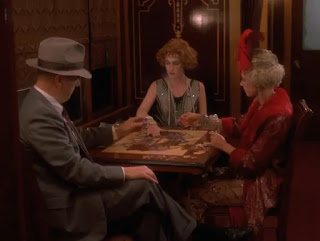“Unlikely as it may sound, I believe the Enterprise may be forming an intelligence.”
Unlikely, indeed.
With three episodes left in the entire series, they decided to do a holodeck episode about the Enterprise suddenly and inexplicably evolving into something vaguely intelligent. The whys and hows are never fully explained, and Picard hand waves the implications of a brand new form of life drifting off into the cosmos by itself as hopeful. I’m not so sure, given how the new being came into existence.
Okay, let me list the worrying things established by this episode. One, the new being will use lethal force when threatened. Two, it doesn’t acknowledge the existence of the crew as important beyond serving to facilitate its own creation. Three, it used humanity as a template for building its imagination. That sounds like a potentially dangerous narcissist with parent issues.
Of course the crew had to support this creature coming into existence. I mean it is their charter to seek out new life, though I imagine this is the first time that new life has formed quite so close to home. In truth the Federation would probably mothball the Enterprise for extensive and exhaustive research into how and why this creature took over all ship functions with the potential death of everyone board.
That isn’t to say this was a bad episode, or even a bad concept. As an excuse for a holodeck adventure, this has the advantage of being unique. It checks off the boxes for run of the mill Star Trek in pretty much every way, without standing out as all that impressive. If it wasn’t the one before the penultimate episode of the entire series, that would be perfectly fine.
Which probably explains why the presentation of this one was so bloody weird. The idea of the holodeck programs combining is a fascinating idea. The image of the train roaring into Data’s tempest program was a great start. They kept going back to the train, even though it was a relatively uninteresting space and felt a bit too confined. However, I loved when Troi, Data and Worf followed the gangster into the backlots of Paramount and we got to see them in daylight in a modernesque setting. Of course it lacked a sense of reality, like a video game with poor immersion. There were no random people on the streets, and even the aggressive elements of the program were random and fairly basic (i.e. a taxi tries to run Data over).
Speaking of program elements, this was another strong idea that wasn’t implemented all that well. I loved the gangster as a representation of the weapons system, and the engineer as navigation. The conductor must’ve been the ship’s computer, and the guy in armor must’ve been defensive systems. The farmer was probably replication, but I have no idea who the woman was supposed to be.
Bits:
This might be Data's best costume, I mean look at that wig.
Using the train as a representation of the Enterprise, complete with using the train’s controls to slow the ship down was a fun visual.
While the initial Jefferies tube version of the creature was neat looking, the final version in the shuttlebay was a bit underwhelming. I expected it to turn into something.
None of the holodeck sets were constructed for the episode. The train was reused from Bram Stoker’s Dracula, although the interior was touched up to make it appear as though it belonged in the 1920s. The city set was in fact a Paramount standing set for New York.
Quotes:
Picard; “Yes, yes, Data. I know about the Orient Express, but what is it doing on Prospero’s island?”
Data: "Complex systems can sometimes behave in ways that are entirely unpredictable. The human brain for example, might be described in terms of cellular functions and neurochemical interactions, but that description does not explain human consciousness, a capacity that far exceeds simple neural functions. Consciousness is an emergent property."
Geordi: "In other words, something that's more than the sum of its parts."
I think this was the right idea, but perhaps the wrong execution. Or maybe the limitations of budget and time rendered what could have been an amazing concept somewhat tepid. Either way, this episode was very average.
2 1/2 out of 4 Holographic representations of primary ship functions.
Samantha M. Quinn spends most of her time in front of a computer typing away at one thing or another; when she has free time, she enjoys pretty much anything science fiction or fantasy-related.



Such a strange episode. I liked the different people on the train as different parts of the Enterprise, but as a whole, "Emergence" had the potential to be the ultimate holodeck story but it just sort of fizzled out.
ReplyDeleteOnly two episodes to go! We've been reviewing Next Gen since 2014 and there's only two episodes to go!
Some conflicting ideas and presentations here, but also such a cool concept. Despite the problems you mention, I do find this kind of thing absolutely fascinating. How advanced can a computer get before it does become self-aware? Is true AI (not the algorithms that steal other people's work, but actual AI) inevitable, or is it not even possible? Would it react like the Enterprise here, or would it be completely different? It's scary but so very interesting simultaneously.
ReplyDelete